
New Delhi: The Indian government has recently announced its commitment to enhancing and strengthening the electric vehicle (EV) ecosystem in the country by providing support for manufacturing and charging infrastructure. In addition, the government aims to encourage the widespread adoption of electric buses for public transportation networks through the implementation of a payment security mechanism.
The year 2023 witnessed significant growth in EV sales across various categories in India. According to data from the Federation of Automobile Dealers Associations (FADA), electric passenger vehicle sales rose by 114.71%, electric commercial vehicle sales increased by 114.16%, electric three-wheeler sales saw a growth of 65.23%, and electric two-wheeler sales climbed by 36.09%.
To further promote the development of the EV ecosystem, the Indian government has launched several key initiatives. These include the Production Linked Incentive (PLI) schemes for the automobile and auto component sectors, as well as advanced chemistry cell (ACC) battery storage. The PLI scheme for the automobile and auto component sectors has a budget of Rs 25,938 crore over five years, aiming to incentivize domestic manufacturing of advanced automotive technology products and attract investments in the automotive manufacturing value chain.
Similarly, the PLI scheme for ACC battery storage has an allocated budget of Rs 18,100 crore over seven years. Its objective is to enhance India’s manufacturing capabilities and export potential in this sector by encouraging major domestic and international players to invest. Notably, some approved firms have already signed agreements to establish manufacturing facilities with a total capacity of 30GWh ACC.
Another significant initiative is the Faster Adoption and Manufacturing of Electric Vehicles (FAME) scheme, which aims to facilitate the adoption of EVs. Under the FAME II scheme, the government has provided subsidies totaling Rs 5,228 crore as of December 1, 2023, supporting the sale of 11,53,079 EVs. The scheme, which has a total budget of Rs 10,000 crore over five years, grants subsidies for the purchase of 7,000 electric buses, 5,00,000 electric three-wheelers, 55,000 electric cars, and 10,00,000 electric two-wheelers. Additionally, the creation of EV charging infrastructure is also supported through the FAME II scheme.
Finance Minister Nirmala Sitharaman, while presenting the Interim Budget 2024, expressed the government’s commitment to expanding and strengthening the EV ecosystem through continued support for manufacturing and charging infrastructure. Furthermore, the government intends to encourage the adoption of electric buses for public transportation networks by implementing a payment security mechanism.
According to data from the Ministry of Heavy Industries (MHI), numerous state and city transport undertakings, as well as municipal corporations, have placed orders for a total of 3,390 electric buses under the FAME II scheme. Out of these, 3,037 units have already been deployed. Moreover, through the Convergence Energy Services Ltd (CESL) under the aggregation model of NITI Aayog, the case for an additional 3,472 electric buses is being processed, with 454 units already deployed.
As part of the FAME II scheme, a total of 148 EV public charging stations have been commissioned, facilitating the growth of the charging infrastructure network. In line with this, the MHI has allocated Rs 800 crore to Indian Oil, Bharat Petroleum, and Hindustan Petroleum in March 2023 for setting up 7,432 public fast charging stations nationwide.
In summary, the Indian government’s proactive measures to expand and fortify the EV ecosystem include financial incentives, manufacturing-linked schemes, and subsidies for the purchase of electric vehicles. These efforts are complemented by initiatives to develop widespread charging infrastructure and promote the adoption of electric buses in public transportation networks. Through these endeavors, the Indian government aims to promote sustainable and environmentally friendly mobility solutions while supporting domestic manufacturing and attracting investments in the EV sector.








